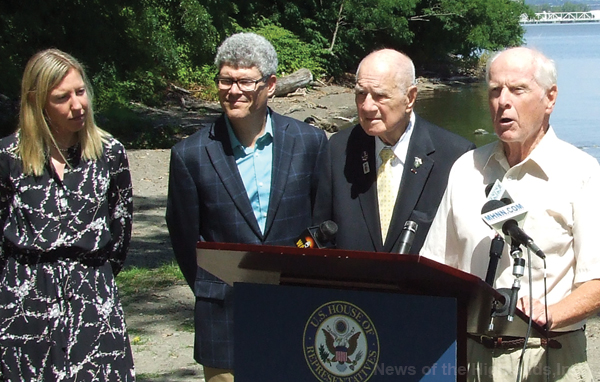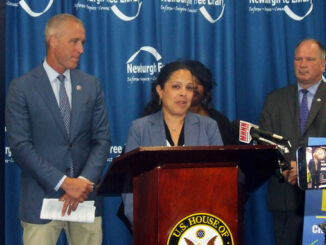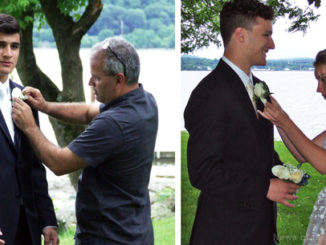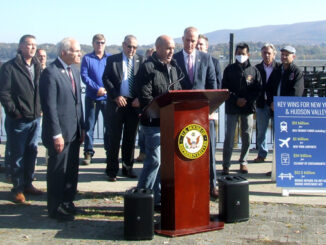
With the Hudson River serving as an appropriate backdrop, state, county, and local representatives, as well as environmentalists, met at Plum Point in New Windsor, on Aug. 18, to speak out against the U.S. Coast Guard’s proposal for 43 berths (allotted places for ships) at 10 new anchorage sites along the river.
The Coast Guard has cited safety as the reason for the proposal. The new locations would allow commercial vessels to anchor in the event of ice or bad weather.
“This is one of the most pristine and beautiful spots along the river,” Congressman Sean Patrick Maloney said of their location. “Of course every spot along the Hudson River is equally beautiful, equally sensitive, and equally important to the local economy that depends on tourism, recreation, and use of this river.”
Maloney, who headlined the press conference, was first to complain about a lack of public input. He’s worried that once residents are allowed to voice their opinions, it will be too late to reverse any decisions.
“One of my great frustrations in Washington is I see federal agencies making decisions that affect local communities without enough input from those local communities. So far we haven’t had a sufficient level of that public input and we’re not likely to get it for months and months when these plans will be so far down the track, we don’t know if we’ll ever pull them back.”
Although comments could be submitted to the Coast Guard, no public hearing has been scheduled, something Cornwall-on-Hudson Mayor Brendan Coyne has requested. During the press conference, Coyne highlighted the many users of the river including two kayak companies, as well as the Cornwall Yacht Club. He criticized the Coast Guard for failing to notify community leaders along the Hudson.
Maloney also spoke in favor of public hearings, as well as an environmental impact study to determine the effect on local communities. He said the anchorages will have a negative impact on communities using the river as a recreational resource.
One of the congressman’s theories, with regards to the push for these anchorages is the tremendous amount of infrastructure planning done based on high energy prices and extraction of domestic oil.
“Since the dramatic reduction in energy prices, particularly in the petroleum markets, a lot of this infrastructure may not be necessary and may not have to be built. One of the things I’m suspicious of, in this process, is these plans were put in place with the expectation of massive increases in the amount of crude oil being transported down the Hudson River.”
Paul Gallay, president of Hudson Riverkeeper, questioned why residents have to put up with noise, unnecessary lighting, interference with recreation and community character, revitalization plans, as well as 10 more locations when two are serving their purpose. He had one answer: crude oil.
The two anchorages are currently located at Yonkers and Hyde Park. Additional anchorages are proposed for: Kingston Flats South, Port Ewen, Big Rock Point, Milton, Roseton, Marlboro, Newburgh, Tompkins Cove, Montrose Point, and Yonkers.
Gallay also noted sturgeon living in the river will be affected by the additional anchors and their chains.



